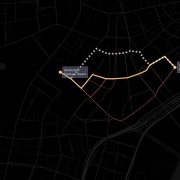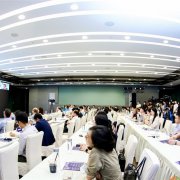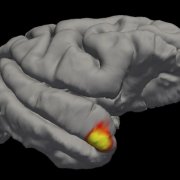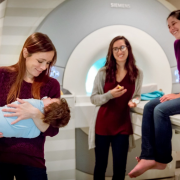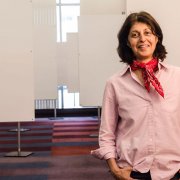October 18, 2021 - 10:45 am
We seem to be wired to calculate not the shortest path but the “pointiest” one, facing us toward our destination as much as possible.
Anne Trafton | MIT News Office
Everyone knows the shortest distance between two points is a straight line. However, when you’re walking along city streets, a straight line may not be possible. How do you decide which way to go?
A new MIT study suggests that our brains are actually not optimized to calculate the so...
October 5, 2021 - 4:00 pm
Singleton Auditorium (46-3002)
Prof. Daniela Rus, Director of the Computer Science and Artificial Intelligence Laboratory (CSAIL) , Deputy...
The Fall 2021 Brains, Minds, and Machines (BMM) Seminar Series will be hosted in a hybrid format.
Please see the information included below regarding attending the event either in-person or remotely via Zoom connection
Abstract: In this talk, we will discuss the nuts and bolts of the novel...
Please see the information included below regarding attending the event either in-person or remotely via Zoom connection
Abstract: In this talk, we will discuss the nuts and bolts of the novel...
September 29, 2021 - 9:00 am
The firm worked with UK weather forecasters to create a model that was better at making short term predictions than existing systems.
by Will Douglas Heaven
First protein folding, now weather forecasting: London-based AI firm DeepMind is continuing its run applying deep learning to hard science problems. Working with the Met Office, the UK’s national weather service, DeepMind has developed a deep-learning tool called DGMR that can...
September 28, 2021 - 4:00 pm
PILM Seminar Room 46-3310
Dr. Lucas Tian, Rockefeller University
Abstract: Compositionality is a key signature of the mind. It is the ability to generalize from a small set of rules to an almost unlimited set of complex thoughts and behaviors. Compositionality is critical for many domains of intelligence, such as language, social reasoning, and motor planning....
September 21, 2021 - 4:00 pm
Singleton Auditorium (46-3002)
Prof. Aude Oliva, Senior Research Scientist, CSAIL; MIT Director MIT-IBM Watson AI Lab; Director MIT Quest...
Abstract: The human brain is a time machine; We are constantly remembering our past, and projecting ourselves into the future. Capturing the brain’s response as these moments unfold could yield valuable insights into both how the brain works and how to better design human-centered AI systems. In...
September 20, 2021 - 11:15 am
Sanmay has worked with the US Treasury department on machine learning approaches to credit risk analysis, and occasionally consults in the areas of technology and finance.
“Avoid incrementalism and the desire to measure the value of your research by competitive benchmarks and metrics.”
Sanmay Das
For this week’s ML practitioner’s series, Analytics India Magazine (AIM) got in touch with Sanmay Das, whose research interests are in designing...
September 14, 2021 - 4:00 pm
Singleton Auditorium (46-3002)
Prof. Ila Fiete, MIBR, BCS Dept., MIT
The Fall 2021 Brains, Minds, and Machines (BMM) Seminar Series will be hosted in a hybrid format.
Please see the information included below regarding attending the event either in-person or remotely via Zoom connection
Abstract: Episodic memory involves fragmenting the continuous stream of...
Please see the information included below regarding attending the event either in-person or remotely via Zoom connection
Abstract: Episodic memory involves fragmenting the continuous stream of...
August 19, 2021 - 10:00 am
Tentative agenda (pdf) - updated 8/16/2021
Zoom connection details:
Topic: CBMM 2021 Retreat
Time: Aug 19, 2021 10:00 AM Eastern Time (US and Canada)
Join Zoom Meeting: https://mit.zoom.us/j/99434748270?pwd=Rm5LSjRDcUo0N2xtd2Z0NzlyMkJQQT09
Password: 123167
One tap mobile
+16465588656,,99434748270#...
Zoom connection details:
Topic: CBMM 2021 Retreat
Time: Aug 19, 2021 10:00 AM Eastern Time (US and Canada)
Join Zoom Meeting: https://mit.zoom.us/j/99434748270?pwd=Rm5LSjRDcUo0N2xtd2Z0NzlyMkJQQT09
Password: 123167
One tap mobile
+16465588656,,99434748270#...
July 22, 2021 - 2:30 pm
AlphaFold neural network produced a ‘totally transformative’ database of more than 350,000 structures from Homo sapiens and 20 model organisms.
Ewen Callaway
The human genome holds the instructions for more than 20,000 proteins. But only about one-third of those have had their 3D structures determined experimentally. And in many cases, those structures are only partially known.
Now, a transformative artificial intelligence (AI) tool called...
July 9, 2021 - 11:45 am
Do we need to understand the brain to make progress in artificial intelligence? In the first podcast in the series, Stuart Russell and Tomaso Poggio contrast “deep learning” with our own organic neural networks. In an age of great demonstrations by the likes of Deep Mind and OpenAI, our guests make the case for focusing on controlled experimentation, and question the wisdom of using AI in science before it is fully understood. The mystery of...
July 9, 2021 - 11:15 am
by Hu Min
World Artificial Intelligence Conference
More than 100 scholars, professors and experts in artificial intelligence fields brainstormed the development trends of cognitive intelligence and the Conscious Turing Machine at a forum in Shanghai on Friday.
Topics covered at the "Cognitive Intelligence – Change the World" forum included the science and engineering of artificial intelligence, prospects for classical AI, interactive teaching...
July 1, 2021 - 11:30 am
Scientists have long searched in vain for a class of brain cells that could explain the visceral flash of recognition that we feel when we see a very familiar face, like that of our grandmothers. But the proposed "grandmother neuron"--a single cell at the crossroads of sensory perception and memory, capable of prioritizing an important face over the rabble--remained elusive.
Now, new research reveals a class of neurons in the brain's temporal...
June 29, 2021 - 11:00 am
The challenges of tackling this question are so daunting that few have tried. But Heather Kosakowski, a PhD candidate at MIT, is determined to find answers.
by Rachel Fritts, SM ’20
It‘s Ursula’s third time in the functional MRI machine. Heather Kosakowski, a PhD student in cognitive neuroscience, is hoping to get just two precious minutes of data from her session. Even though Ursula has been booked to have her brain scanned for two hours, it’s...
June 24, 2021 - 10:15 am
by Raleigh McElvery
A lifelong interest in teaching brought Mandana Sassanfar to MIT, where she has established programs to engage diverse students and forged partnerships with institutes across the country.
Of all the offices in Building 68, Mandana Sassanfar’s is perhaps the most colorful. Her walls are lined with photos of students past and present, each of whom completed one or more of the six outreach programs she heads as the Department of...
June 15, 2021 - 2:00 pm
This seminar talk will be hosted remotely via Zoom.
Guangyu Robert Yang, Dept. of Brain and Cognitive Sciences (BCS), EECS Dept., Schwarzman College of...
Abstract: Recurrent Neural Networks (RNNs) trained with machine learning techniques on cognitive tasks have become a widely accepted tool for neuroscientists. In comparison to traditional computational models in neuroscience, RNNs can offer substantial advantages at explaining complex behavior and...

